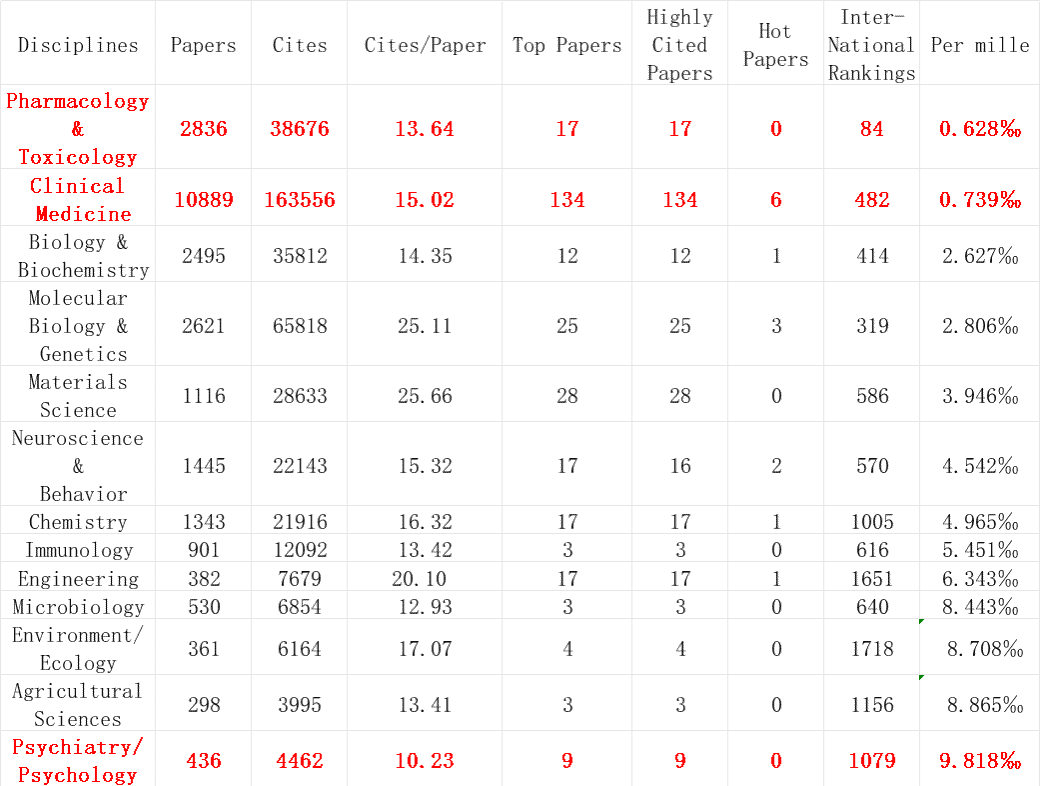- +1! WMU Achieves Outstanding Results in ESI Rankings with 13 Disciplines Entering Top 1%
- Author:Graduate School Date:November 29, 2024
Recently, Clarivate Analytics reported the ESI rankings for November 2024. Wenzhou Medical University has achieved continued success with its Psychology/Psychiatry discipline newly entering the global Top 1% list. As of now, 13 disciplines of our university have been ranked in the top 1% of the ESI global rankings. Among them, Pharmacology & Toxicology, and Clinical Medicine have been ranked in the top 1‰. WMU’s overall ranking is 611th among the 9533 listed institutions in the world, placing the university within the top 6.9% globally. Domestically, WMU is ranked 74th overall and 5th among the independent medical universities and colleges. Specifically, Pharmacology & Toxicology is ranked top 0.628‰ in ESI global rankings, and Clinical Medicine has entered the top 0.739‰. Rankings for all other disciplines also showed significant improvement.
ESI Rankings for Institutions (Independent Medical Universities and Colleges)

ESI Discipline Rankings

The Psychiatry/Psychology discipline relies on robust research platforms, including the National Key Clinical Specialty (Psychiatry), the Zhejiang Clinical Research Center for Mental Health, the Zhejiang Provincial Key Laboratory of Alzheimer’s Disease, and the Zhejiang Provincial International Cooperation Base for Digital Psychiatry and Diagnosis and Treatment of Alzheimer's Disease. Research interests include the mechanisms and drug development of mental disorders, Alzheimer's disease, digital psychiatry, addiction, and child and adolescent mental health. The discipline has introduced several foreign academicians as full-time discipline leaders, cultivated multiple disciplinary innovation teams and a group of mid-career and young discipline backbone members and gained remarkable achievements in the fields of psychiatry and psychology.
In recent years, the CPC Zhejiang Provincial Committee, the People's Government of Zhejiang Province, the Education Work Committee of the CPC Zhejiang Provincial Committee, and the Department of Education of Zhejiang Province have attached great importance and provided strong support for the development of WMU. The university has aligned its efforts with the national strategic needs and effectively allocated resource elements. It focuses on the provincial peak discipline (pharmacy) and leverages its clinical medicine strengths to drive research breakthroughs in bio-pharmacy and ophthalmology & optometry. WMU has been actively promoting the construction of five advantageous and characteristic discipline clusters, such as a cluster focusing on critical care medicine and regeneration and repair of tissue and organ, and a cluster of ophthalmology and optometry. Besides, the university has deepened substantial cooperation between medicine, engineering, and the humanities, facilitated multidisciplinary research, and guided its affiliated hospitals to establish a research-practice collaborative development system with the core of solving clinical problems, forming a new landscape where peak disciplines lead to the overall development of all advantageous disciplines. WMU has strived to create a vibrant and harmonious ecosystem for discipline development and built "comprehensive pharmaceutical science" and "comprehensive clinical medicine" systems that encompass healthcare, education, research, industry, public welfare, and promotion.
Essential Science Indicators (ESI) is a fundamental analysis and evaluation tool for measuring scientific research performance and tracking scientific development trends. It is a quantitative analysis database based on more than 10 million papers from more than 12,000 academic journals worldwide indexed in the Web of Science (SCIE/SSCI) from Clarivate Analytics (formerly Thomson Reuters). ESI categorizes all sciences into 22 specialized areas and plays a crucial role in evaluating the international academic standing of universities, academic institutions, and countries/regions. Disciplines ranked in the top 1% are generally considered to be of high international standard, and those in the top 1‰ are recognized as standing at the forefront of their field globally.
Text translated by Wu Zehan and reviewed by Sun You.
